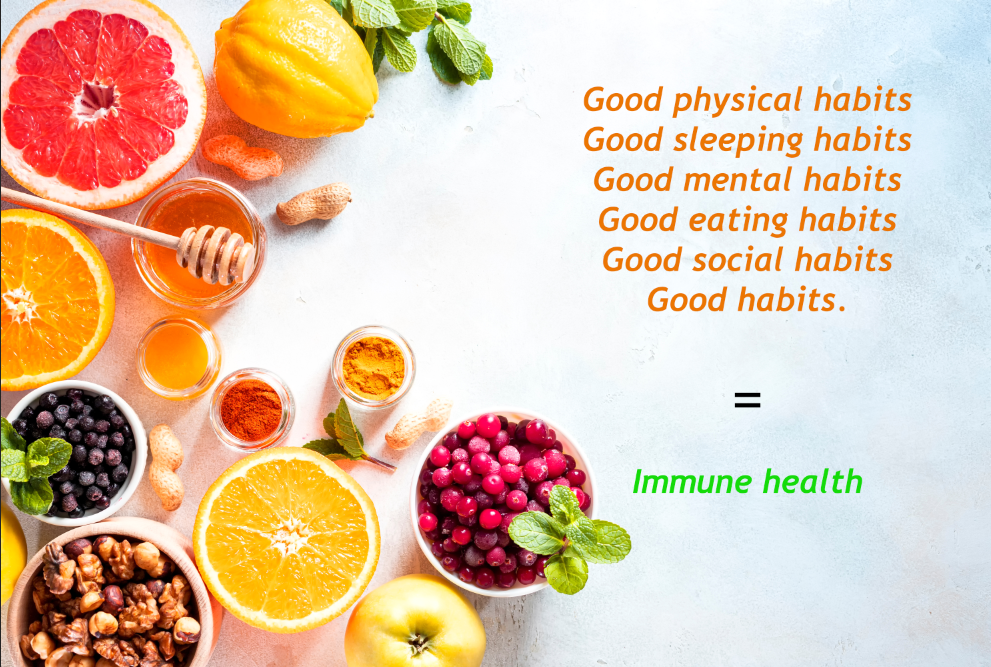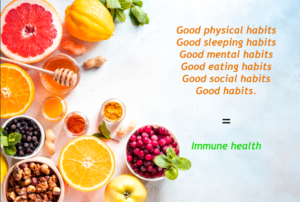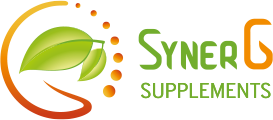
Good Habits and Immune Health

” Immunity is a complex machine, smiles Jean-Luc Teillaud, immunologist. It involves several types of white blood cells, which interact with each other and are able to react very quickly in case of external aggression,” explains the specialist.
I personally love the Fall! Back to school puts me in a more regular mode for sleep hours, taking supplements and having a routine.
Vacations are nice and important, but I love my routine. For me, it’s not monotonous! It’s bringing the regularity of meals, work and time for exercise!
This discipline (the word is strong, I prefer regularity) promotes a stronger immune system.
At school, our children and teachers, the daycare and the return from work to the office, have more impact on our health, in the sense that we are in contact with more people, germs and therefore we are more prone to infections. Consider the flu, colds, sore throats and infections of all kinds.
That’s why in this newsletter, I want to recommend ways to protect yourself and prevent these discomforts.
If immunity is decreasing as winter approaches, it is not without reason. In some people, the production of serotonin decreases between autumn and winter, and causes the onset of a depressive syndrome, fatigue and stress. However, this hormone is secreted not only by neurons, but also by cells of the immune system, and more than 95% of serotonin is not produced by the brain, but by the intestine. It is not uncommon to have sugar cravings, especially at the end of the day and in the evening, when the days get shorter and the light decreases. This is quite normal, as the body tries to compensate for the drop in serotonin in the brain. So, boosting serotonin production means fighting against stress, and therefore boosting your immune system!
To boost serotonin production, and therefore neural and intestinal immune cell function, be sure to focus on slow-digesting carbohydrates such as whole grain breads and pastas, whole grains and brown rice.
Sleep 7 to 8 hours a night, and during the day, let as much sunlight as possible into your home, or your workplace if you can.
Regular physical activity, such as simply walking for 30 minutes a day, improves blood circulation, helps increase immune cells and reduces the risk of respiratory infection by 40%. On the other hand, overtraining would have a rather negative impact: after a session of a sport that is too intense, we observe a drop in the rate of lymphocytes, which implies fewer potential antibodies in case of aggression. It is up to you to find the right balance, without forcing yourself.
Vitamin A stimulates the proliferation of white blood cells and the production of antibodies by lymphocytes. It is also essential to the barrier function of the intestinal mucosa. The right dose: 10,000 mg per day. For an intake, think of carrots, pumpkin or spinach, but especially cod liver oil capsules or liquid.
Vitamin C: It is a powerful antioxidant that protects white blood cells and increases their mobility. It stimulates the production of cytokines, the messengers that activate the immune response. It is found in fresh fruits and vegetables. The recommended daily dose is 2000 mg per day.
Vitamin E: refers to a group of molecules called alpha-tocopherols. These are naturally present in food, such as in sunflower seeds or vegetable oils. Studies have shown that vitamin E compensates for the loss of immune response due to aging, by stimulating the production of white blood cells and its interest in the fight against respiratory infections.
Vitamin D: is known to activate the white blood cells (T lymphocytes) needed to make antibodies and destroy microbes. It is mainly found in fatty fish (cod liver and its oil, herring, mackerel and other fatty fish). Two forms are the most common, D2, of plant origin, and D3, of animal origin. There is no difference in effectiveness between the two, but a minimum recommended intake of 3000 IU per day is potentiated by daily exposure to daylight, as vitamin D production is mainly induced by UV rays.
Selenium, found in Emmenthal cheese, cooked ham or button mushrooms as well as brazil nuts. At a rate of 50 micrograms per day, it intervenes at the immune level by keeping a pool of white blood cells on alert.
Zinc, (seafood, poultry, cheese, pumpkin seeds…) at a rate of 20 to 30 mg per day, protects cell membranes from infection by microbial agents. All these active ingredients, in quarterly cure, will put back at level your annual stocks for a winter in all serenity.
Several kinds of medicinal mushrooms are available to you: Cordyceps, Lyon’s Mane, Reishi, and others. I prefer a mixture of different mushrooms. They are a great help for a guaranteed immune system.
Ravintsara, tea tree, savory or thujanol thyme and eucalyptus radiata essential oils are excellent antiviral and immunostimulants. I place one drop of either in an empty capsule, or inhale. Five days a week.
Black cumin oil is an excellent antioxidant and immune system booster. I suggest one teaspoon in the morning, for 30 days.
For optimal immunity, it takes a little effort, but how pleasant it is to spend a winter without infections! Energy will also be at the forefront.
To help you achieve this optimal immune health, I would like to invite you to take a look at the following products:
VitaSoleil Vitamin D Natural Factors
Be well!



